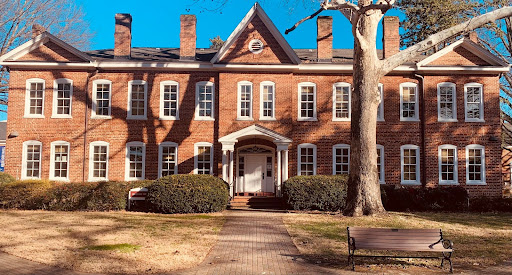The end of the Edge

Archdale Hall, Home of the History Department and Professor Chen’s office, along with others.
For the past four years, Guilford College’s administration has been conducting an experiment involving every student and professor. At the advent of the fall semester in 2019, the academic calendar changed to implement three-week and 12-week terms as part of what was called the Guilford Edge. As of last semester, the professor and administrative bodies have voted to change the schedule, moving to two 14-week terms and a three-week term each year. As one of the first self-described guinea pigs of this experiment, I believe that I am in a position to discuss its results and shortcomings.
I feel that the 3-12/12-3 program was not a success and that a change is greatly needed. It truly seems like the administration at the time was trying to create something that would help Guilford stand out among other schools at the time, to add some flair to the College’s offerings. I understand that for first-year students, the initial three-week course acted as a succinct and helpful introduction into college life for those who needed it, and provided a space to learn what life and work on campus might look like. However, after that initial period, the three-week seems needless.
For some professors, it was a complicated effort to stuff 15 weeks of content and information into just three weeks. Professor Zhihong Chen, the current chair of Guilford’s history department, described the difficulties of the 3-12/12-3 calendar: “It posed challenges to instructors, because we have to change every syllabus, and how to fit things into the three-week schedule is especially challenging.”
Chen and many other professors are sympathetic to students for whom the three-week caused scheduling conflicts with their other activities. However, Chen said that she was just getting used to the three-week structure, and that with the new calendar change, she and other professors will have to adapt to new daily schedules, and recreate or update their syllabi again. This will inevitably lead to even more work and possible complications for the professors.
Despite the many problems and complaints that the entire Guilford community may have with the 3-12/12-3 system, there are certainly some perks to it. Classes that include study abroad opportunities, like the upcoming Transnational Memories class offered this spring, work well in the three-week term: students will only have a single focus at the end of the year, and can dedicate time to explore abroad. I think that some film classes are also ideal for the three-week term. However, the same cannot be said for more intensive classes that require more time for students to fully grasp the material.
Chen and I agree that a change to the academic calendar is necessary, but I am unsure that the 14/14-3 system is the best change. While it is certainly a step in the right direction, it doesn’t feel like a complete resolution to the issues of the 3-12/12-3 system. To me and some of my peers, the lengths of the different terms feel a bit off-balance. If we are extending the terms to 14 weeks, why not make them 15? If we are retaining a three-week on the tail end, why not make the spring 14-week term 12 weeks to create a balance of 15 full weeks for each semester?
I can understand holding on to the spring three-week term, as many classes were designed for it, but the entire school year feels incredibly off-kilter. All in all, I am glad that a change is coming for Guilford, because the Guilford Edge experiment hasn’t worked out as well as the previous administration had hoped. However, I feel that the 14/14-3 structure is only a part of the solution, not the complete resolution to the schedule issue.










